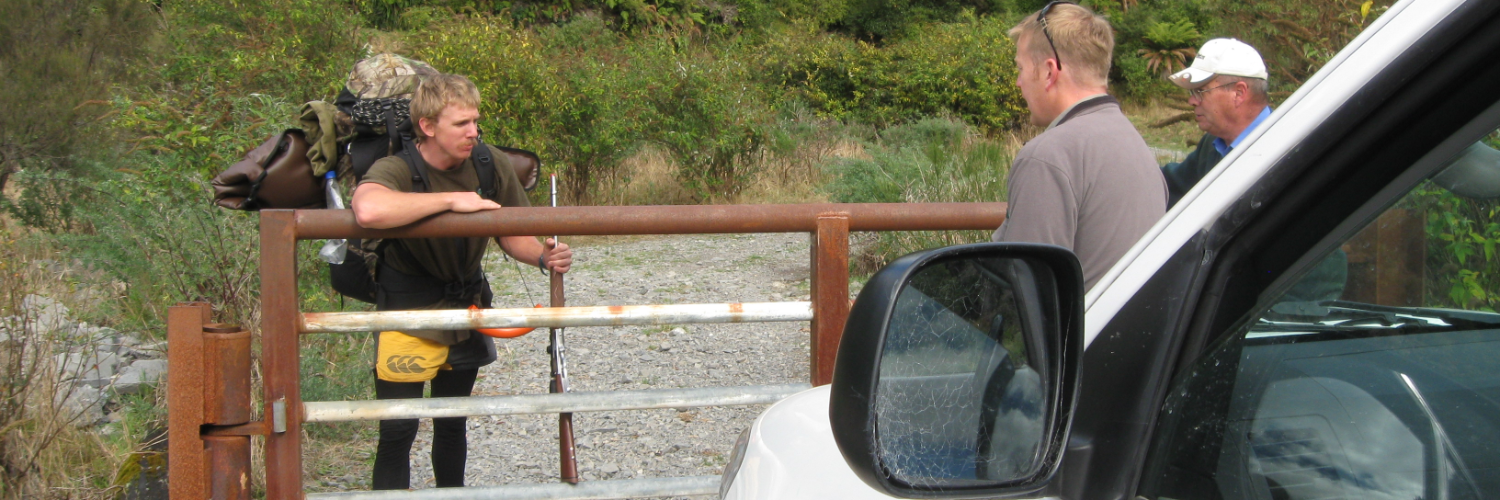The art of negotiating access
Negotiating access to New Zealand’s outdoors requires extensive knowledge, delicacy, flexibility and understanding, along with an unwavering belief in the value of outdoor access.
Each year, the New Zealand Walking Commission mediates in hundreds of cases involving landowners, with the ultimate objective of protecting New Zealand’s natural heritage by promoting free, certain, enduring and practical access to the outdoors.
Helping to resolve often difficult access issues means having the ability to be a good listener, to be genuine, and to “apply a curious mind,” as Inger Perkins, regional field advisor for the West Coast learned during training.
The Commission’s 12 regional field advisors have diverse backgrounds, but common threads include skills in mediation and experiences in conservation, farming and the outdoors.
Their work is intensely varied, and no two regions are identical. But one thing these advisors all agree on is that it’s never dull work, and that the rewards far outweigh the challenges.
John Gibbs, who oversees Taupo and Bay of Plenty, is one of the longest-serving regional field advisors. He has been in the role since 2011. Prior to that, he worked on access-related issues for nearly five decades.
“It doesn’t get any easier,” he says.
“The challenge is when people have a fixed view about a place or a situation. When it’s clear they’re wrong, it can be difficult to change their minds. The fact is that if you’re asked to come around from a position you’ve held for a long time, you need to be able to save face.”
A regional field advisor’s role is wide-ranging. It is, generally, to facilitate public access. Specifically, it is about delivering direct assistance by way of advice and support for groups and individuals trying to establish access; helping to resolve access disputes by providing quality and factual information about land status and about access dispute resolution; and providing a suite of tools to help people better understand aspects such as access rights and responsibilities.
The amount of legal and technical knowledge that is needed in the role is one of the key challenges regional field advisors face, says Rod Smillie, who took on the role for the Manawatū, Whanganui and Taranaki regions in July.
“The biggest challenge is getting your head around the legal technicalities relating to instruments of access,” he says. “You have to be careful about offering advice off the top of your head.”
Alongside technical knowledge, advisors need persuasive skills, patience and flexibility. Often, it’s a good idea not to impose outcomes on parties involved in an access issue. Mr Gibbs describes a situation he managed that involved a farming couple who were adamantly opposed to the notion of unlimited public access on a walking track that partially crossed their property. There was also an unformed legal road bisecting the property which the public could use as of right as an alternative access.
“There was quite a long period of engagement. Rather than tell them they had to grant access, we explained that it was their prerogative whether or not to grant access on the existing track and that we could help them manage that. Going in hard right at the start with the rights of people to access the unformed legal road would have pushed them into a defensive position and closed other options."
In the end, the farming couple agreed to grant access all along the river bordering their land as well as the existing track.
“We got them to see that there were actually reputational benefits to them. That had an impact,” he says.
One of the key aspects of talking to landowners is considering what value it adds for them, says Felicity Brough, regional field advisor for the Waikato region and an experienced farmer herself.
A few times, for example, she has found that landowners don’t know the boundaries of their properties until the Commission helps them clarify these via its mapping system. She also points to a case where the Commission was involved in correcting inaccurate information displayed on a fishing website about a particular farmer’s stream, a correction for which the farmer was grateful.
Generally, open-mindedness and a genuine interest in what people have to say make all the difference, says operations manager Ric Cullinane.
“Turning up at a first meeting with a line on a map is a bad idea. You need to approach it with an open-ended question, and understand where people are coming from and asking for advice. Often, landowners are best placed to provide good options and solutions.”
Patience too is key, he says.
“None of this is ever going to be sorted over the weekend.”
A key aspect that everyone seems to agree on is never to pre-judge an outcome.
“When you look at a case, take it at face value, don’t hang on to the outcome because that might not be the result you get,” Ms Brough says.
Mr Gibbs agrees. “It’s important to be flexible and not fixated on a plan,” he says.
Inger Perkins also says keeping an open mind is key: “Working towards a solution through open questions and discussion rather than diving in with pre-conceived solutions is essential.”
One of the best things about the role is the people you get to work with, she says.
“My colleagues at the Commission are extraordinary in their support, in what they contribute and their massive experience. They’re one of the best teams I’ve ever worked with.”

